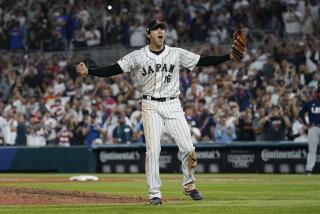NEWS ANALYSIS : Many Japanese Skeptical of Clinton’s Trade Pitch
- Share via
TOKYO — The images had been choreographed to win the hearts and minds of the Japanese: President Clinton on a stool answering questions from attentive university students; Clinton kneeling down beside winsome schoolchildren; Clinton walking hand in hand with charming wife Hillary Rodham Clinton.
It was the same combination of youthful vigor and shrewd campaign tactics that Clinton used to win the presidency.
But the President’s effort to use the G-7 summit as a vehicle for reaching past the Japanese government to win the Japanese public over to his position on trade has had, at best, mixed results.
Clinton impressed some with his youth. Others found him unpresidential.
A few were thrilled by his mingling among the people as he pressed his case for more open Japanese markets and reductions in Japan’s trade surplus with the United States; many found the efforts staged.
More important, Clinton’s notion--put forward in a major speech at Waseda University--that American interests in trade talks are the same as the interests of Japanese consumers--fell flat among a people who don’t easily distinguish between their interests as consumers and their broader interests as Japanese citizens.
To be fair, Clinton started his trip with a major handicap. According to a survey made public by the Tokyo Broadcasting System on the day of his arrival in Japan, two out of three Japanese do not trust him and nearly half believe that America is making a scapegoat of Japan.
And some of Clinton’s failure may be attributable to the way the Japanese press has covered his trip.
Japanese television and newspapers carried little of the Waseda speech, and what they did have focused not on Clinton’s pitch for a more open Japan--a message that was old hat to most Japanese--but instead on his call for a new regional effort in Asia centered on the U.S.-Japan alliance.
Television commentators cynically reported how Clinton’s walk down a narrow Tokyo street was staged by a Hollywood producer. Clinton’s telephone call to the parents of the Japanese exchange student shot to death in Louisiana last October was also reported to the President’s disadvantage.
The student’s mother, Maeko Hattori, said she believed Clinton was sincere about trying to enforce gun control. But it was her later comment--that Clinton would never have made the phone call if hundreds of thousands of Japanese hadn’t signed a petition calling on America to enact gun control--that television chose to show.
But it wasn’t just the medium, it was also the message.
Clinton’s suggestion that Japan’s restrictive trade policies have resulted in high prices and “deprived you as consumers of the full benefit of your hard and productive work” rang hollow among Japan’s young.
“Maybe prices would be cheaper (with liberalization), but we are in no mood to buy things,” said Kiyomi Murata, an American studies major at Saitama University who watched parts of the speech on television. “Shops are closing, companies are going bankrupt. Now is not the time to change things.”
Added Noriko Hirakawa, who said she is a doctor’s wife, “Japanese consumers might be better off, but what about producers?”
Hirakawa said Clinton’s message didn’t ring true because it sounds as if Clinton is asking the Japanese to sacrifice when Americans are the ones who live in big houses.
“Our life isn’t that good. It doesn’t feel like we are the ones with the surplus,” she said.
Shuichi Kitamura, 46, a salesman for a towel wholesaler, agreed with Clinton that increasing imports will help Japan live better by cutting prices. But he said he has no intention of boosting exports when it comes to his own business.
“Japanese towels are of better quality than American towels,” he said.
To many young people here, Clinton simply isn’t believable.
“He is like a bright, clean, cheerful pamphlet,” said Makiko Fukayua, a 22-year-old humanities major. “I can’t get a feeling for his real character.”
Others were put off by his glibness.
“I got the impression that Clinton likes to grandstand,” said Tsumaki Oku, a 20-year-old literature major.
“I would like to believe in his message of U.S.-Japan partnership,” Lisa Ono, a law student, told a Japanese newspaper. However, she argued that Clinton’s efforts to set numerical targets to increase Japanese imports creates “anti-American feelings.”
Engineer Motoo Mogi wondered if it was appropriate for Clinton to be telling Japanese what they should be doing about their domestic policies.
“It is really our own problem,” he said.
But, unlike the students, he thought that the President may be having some impact.
“He is very powerful,” Mogi said. “You might say he is president of the world.”
More to Read
Sign up for Essential California
The most important California stories and recommendations in your inbox every morning.
You may occasionally receive promotional content from the Los Angeles Times.










